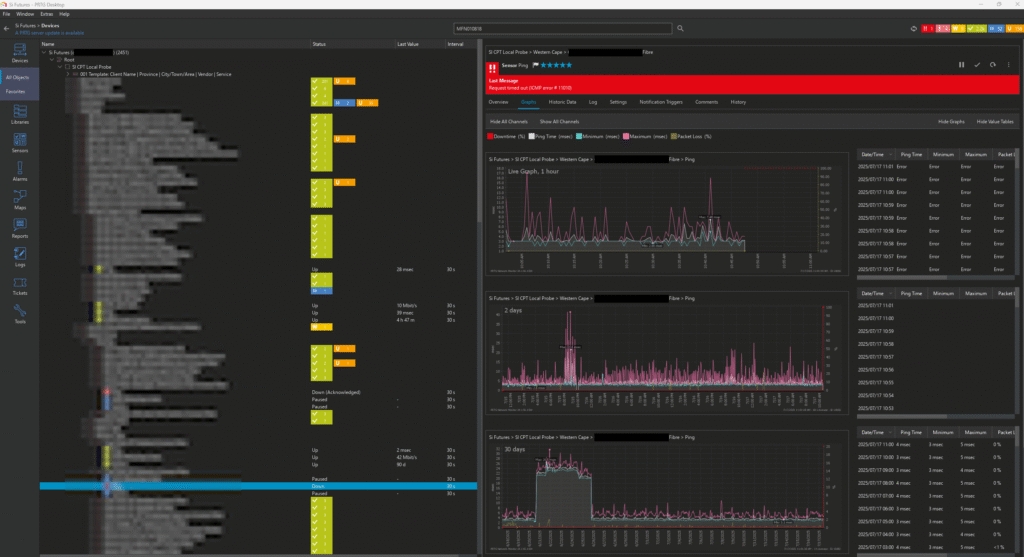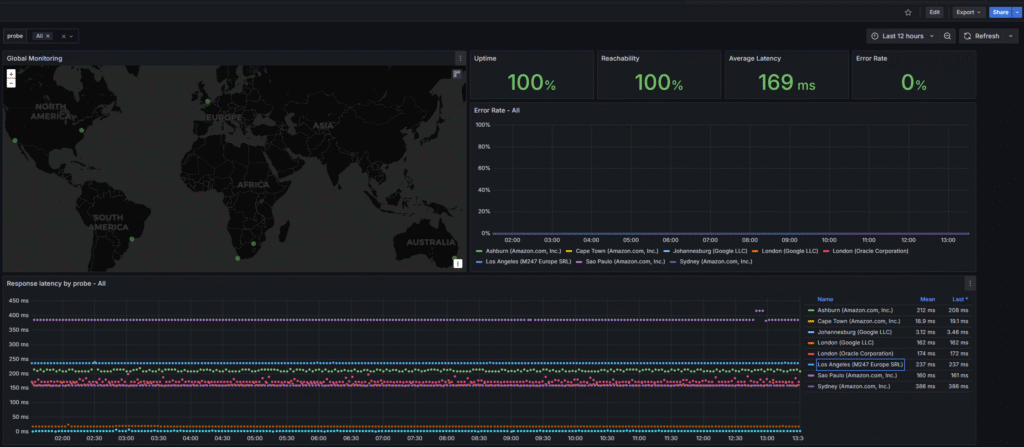Proactive Network Intelligence: How Advanced Monitoring Prevents Business Disruption
| Rudie de Vries, Cloud Services Manager
Beyond Reactive to Proactive Network Monitoring
Most IT monitoring follows a predictable pattern: sensors detect technical thresholds, alerts fire when limits are exceeded, and technical teams respond to restore service. This reactive approach treats monitoring as damage control rather than business protection.
The fundamental limitation isn’t technical capability – it’s perspective. Traditional monitoring answers “what’s broken?” rather than “what might affect business operations?”
Advanced proactive network monitoring shifts this paradigm entirely. Instead of waiting for problems to manifest, intelligent monitoring systems identify patterns, trends, and early indicators that suggest potential business impact. The goal isn’t just faster incident response – it’s preventing incidents from affecting business operations in the first place.

Network Intelligence Business Advantages
Proactive network monitoring operates on several levels simultaneously:
Global perspective monitoring – Rather than monitoring only from your primary data centre location, intelligent systems leverage vendor-based telemetry (Azure, AWS, Oracle) and client-side vantage points. This builds a broader view of route-specific performance patterns and upstream provider behaviour, identifying disruptions earlier and from more strategic angles.
Client-side visibility – Traditional monitoring tests connectivity from provider infrastructure to your environment. Network intelligence business solutions place sensors within your network environment, capturing the actual user experience rather than theoretical connectivity metrics. This reveals performance issues affecting productivity that external monitoring would never detect.
Business-context analysis – Instead of generic threshold alerts, intelligent systems understand your business applications and processes. Monitoring priorities adjust based on business criticality, time of day, and operational requirements. A minor latency increase during off-hours receives different treatment than the same issue during peak trading periods.
Predictive trend analysis – Historical data combined with real-time metrics enable forecasting of capacity requirements, performance degradation patterns, and infrastructure scaling needs. Problems are anticipated and addressed before they impact business operations.
Strategic Service Differentiation
Not every business requires the same level of monitoring sophistication. The key is matching monitoring investment to business risk and operational requirements.
For businesses where technology downtime directly translates to revenue loss, customer dissatisfaction, or regulatory compliance issues, advanced monitoring becomes a strategic necessity. A call centre operation losing connectivity during peak hours faces immediate revenue impact and customer relationship damage.
The strategic decision involves balancing monitoring investment against business risk exposure. This isn’t about technology sophistication – it’s about business protection.
Strategic Cloud Placement Intelligence
One significant advantage of our distributed monitoring architecture lies in cloud services advisory capabilities. By maintaining monitoring probes across multiple Azure and AWS data centres, we gather continuous performance data showing how different geographic locations perform for specific client requirements.
This intelligence transforms cloud strategy decisions. Rather than guessing optimal cloud placement based on theoretical proximity, we provide data-driven recommendations showing actual performance characteristics between client locations and various cloud regions. A manufacturing client expanding internationally receives specific guidance on which Azure regions will deliver optimal performance for their new facilities, backed by months of real-world latency and throughput data.

Technical Implementation Excellence
From a practical standpoint, implementing proactive network intelligence requires sophisticated technical capabilities:
Distributed monitoring architecture – Our approach deploys monitoring probes across key Azure and AWS data centres globally. This distributed intelligence network provides comprehensive visibility into network path performance from multiple geographic vantage points. When connectivity issues occur, this architecture enables precise identification of which specific network segment is experiencing problems.
On-site intelligence gathering – Placing monitoring devices within client environments transforms our understanding of network performance. Rather than assuming connectivity quality based on external tests, on-site sensors provide definitive performance metrics from the business user perspective.
Advanced alerting logic – Traditional monitoring generates alerts based on simple threshold exceedances. Intelligent monitoring incorporates business context, historical patterns, and predictive analytics to distinguish between minor variations and genuine business threats.
Measurable Business Outcomes
The transition from reactive to proactive monitoring delivers quantifiable benefits:
Faster problem resolution – When issues do occur, our distributed monitoring architecture provides immediate diagnostic capabilities. Rather than spending time gathering information about problem scope, our global probe network instantly shows which network paths are affected and where performance degradation is occurring.
Evidence-based cloud strategy – Our distributed probe network provides concrete performance evidence when advising on cloud service placement and optimisation. Instead of relying on theoretical recommendations, you receive specific data demonstrating how different cloud regions and services perform for your geographic and application requirements.
Strategic capacity planning – Historical trend analysis combined with business growth patterns enables informed infrastructure scaling decisions. Rather than reactive capacity additions after performance degrades, you can plan expansion based on projected requirements.
Making the Strategic Investment in Proactive Network Monitoring
Evaluating monitoring solutions requires understanding the relationship between monitoring sophistication and business risk exposure. Consider what geographic factors affect your cloud service performance requirements, how performance patterns vary across different cloud regions for your specific applications, and what regulatory or compliance requirements depend on system availability.
For businesses where technology directly enables revenue generation, customer service, or competitive advantage, proactive network monitoring becomes a strategic investment in business continuity and growth enablement.
Traditional monitoring tells you when things break. Proactive network monitoring prevents business disruption before it occurs. The choice between reactive and proactive approaches ultimately determines whether technology serves as a business enabler or operational constraint.
Discover how our Trusted Response Centre delivers proactive network intelligence that prevents business disruption. Our managed connectivity services include advanced monitoring capabilities that transform IT operations from reactive to predictive. Contact us to explore how intelligent monitoring can strengthen your business continuity solutions.

